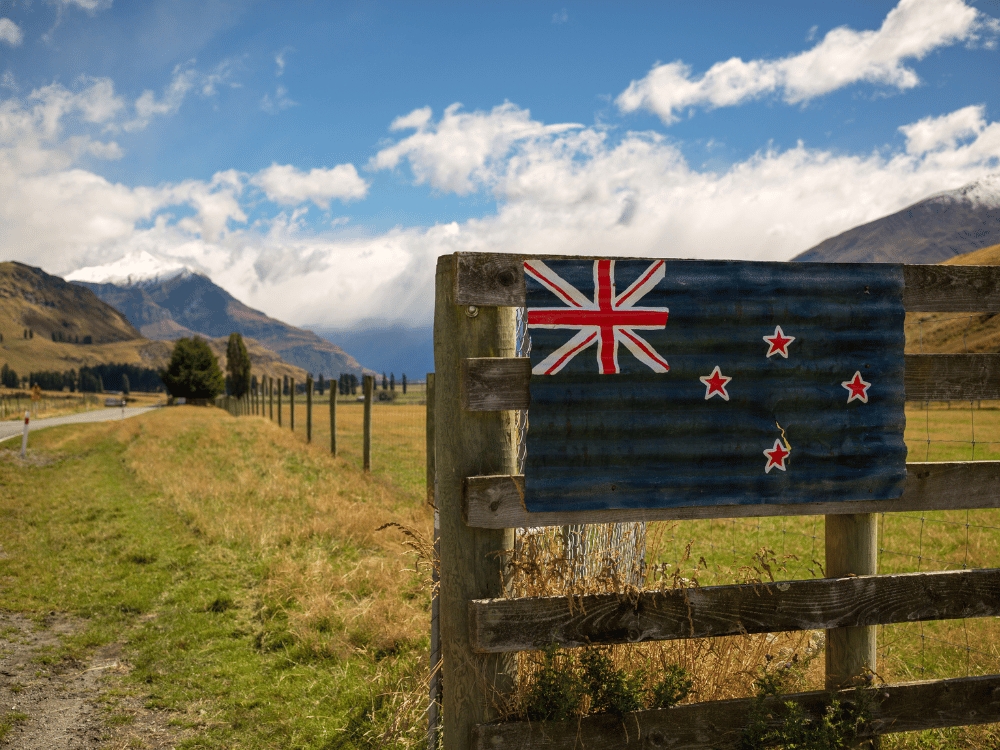Here's some quick facts about New Zealand:
Thinking of moving to New Zealand? Discover everything you need to know in our Ultimate New Zealand Relocation Guide.
Planning a relocation to New Zealand? You're joining thousands of expats every year who move to New Zealand, drawn by its outstanding natural beauty, high quality of life, welcoming culture, and reputation as one of the world's safest and most peaceful nations. It's easy to see why so many people choose to make New Zealand their new home.
New Zealand consistently ranks among the globe's most desirable destinations, offering an exceptional blend of breathtaking landscapes and outdoor adventures, excellent work-life balance and relaxed lifestyle, world-class healthcare and education systems, and stunning geography from pristine beaches to snow-capped mountains, vibrant cities to remote wilderness. From the cosmopolitan streets of Auckland to the windy capital Wellington, the garden city of Christchurch to the adventure capital Queenstown, New Zealand provides expatriates with a unique living experience that combines modern amenities with distinctly Kiwi values of friendliness, egalitarianism, and environmental stewardship.
This ultimate relocation guide for New Zealand will walk you through every essential aspect of the moving process, from visa pathways to settling into Kiwi life. We'll show you how to move to New Zealand step by step - including what to know about shipping your luggage or personal belongings safely overseas. Whether you're planning to work, study, retire, reunite with family, or start a business, we'll provide the practical insights needed to make your transition as smooth as possible.
This ultimate guide covers all the essential aspects when you move to New Zealand, including:
We hope this guide both inspires and informs you. Since information may vary based on individual circumstances, we strongly recommend conducting your own research alongside this guide to ensure your move to New Zealand goes smoothly.







When considering the best way to relocate to New Zealand, proper planning makes all the difference. The first step is determining the right immigration pathway for your situation, as this forms the foundation of your entire move. Once your visa status is secured, you can focus on the practical aspects - organising moving services to New Zealand for your belongings, finding accommodation, and setting up essentials like banking, healthcare registration, and mobile phone services.
It's also wise to research different regions and cities beforehand to find areas that match your lifestyle preferences and budget. Whether you're drawn to Auckland's multicultural vibrancy and job opportunities, prefer Wellington's cultural scene and walkability, want Christchurch's more affordable lifestyle and garden city charm, or are seeking Queenstown's outdoor adventure and tourism focus, each region offers distinct advantages. By addressing these key details early, from flights to finances, you'll ensure a smoother transition and more time to settle into your new Kiwi adventure.
Yes, you'll need the appropriate visa or entry permit to move to New Zealand for work, study, or residence. Choosing the right pathway is crucial, and starting early gives you time to gather documents and meet requirements.
Your eligibility depends on factors like education, work experience, language skills (English proficiency), age, job offers, financial resources, or family connections. New Zealand's immigration system assesses applications based on whether you possess skills, knowledge, or qualifications valuable to New Zealand's economy and society.
Popular immigration pathways include:
Whether you're relocating to New Zealand temporarily or permanently, learn which visa you'll need.
When you relocate to New Zealand, it's essential to look beyond visas and moving logistics to fully understand daily life in this island nation. From education and healthcare to housing options and managing finances, many key factors influence how successfully you'll settle in. Whether you're moving to New Zealand for work, to start a business, study, or reunite with family, these are some of the most common questions and topics people explore when planning their new life in New Zealand.
Retiring to New Zealand is possible through several visa pathways. The Temporary Retirement Visitor Visa (for those 66+) requires NZ$750,000 investment, NZ$500,000 living funds, and NZ$60,000+ annual income for a 2-year stay. The Parent Resident Visa offers permanent residence if you have adult children who are New Zealand citizens or residents. Retirees enjoy excellent healthcare, temperate climate, stunning natural beauty, and safe communities—though distance from Northern Hemisphere family is worth considering.
New Zealand ranks as one of the world's easiest places to start a business. The Business Investor Visa (launching November 2025) and Entrepreneur Work Visa offer pathways for business owners. Benefits include 28% corporate tax, zero capital gains tax, straightforward registration, skilled English-speaking workforce, and access to Australia-New Zealand markets. Requirements include NZ$500,000+ capital, employing 5+ full-time staff, and demonstrating economic benefit to New Zealand.
Finding employment before moving strengthens your visa application considerably. Key sectors hiring include healthcare, IT, construction, agriculture, education, and tourism. The Green List identifies in-demand occupations with fast-tracked visa pathways. Auckland, Wellington, and Christchurch offer the strongest job markets. Expect median wages around NZ$22.75 hourly, with skilled professionals earning NZ$60,000-120,000+ annually. Kiwis enjoy 4 weeks annual leave, 11 public holidays, and excellent work-life balance in a relaxed, egalitarian workplace culture.
New Zealand's healthcare system combines public and private options, ranking highly for quality and efficiency. Public healthcare is free or heavily subsidised for residents, including free hospital care, GP visits (NZ$20-50), subsidised prescriptions (NZ$5 per item), and the unique ACC scheme covering all accident-related injuries regardless of fault. Private healthcare offers faster access and shorter wait times but costs more (consultations NZ$80-200+). Most expats choose private health insurance (NZ$80-200 monthly). Register with a GP and get your National Health Index (NHI) number upon arrival.
Families relocating with children benefit from New Zealand's excellent education system. Public schools provide free, high-quality education for residents following the New Zealand Curriculum. Private schools (NZ$15,000-30,000 annually) and international schools (NZ$20,000-40,000 annually) offer alternatives with British, American, or IB curricula. Early childhood education is heavily subsidised. New Zealand's top universities—Auckland, Otago, Victoria Wellington, and Canterbury—rank among the world's best, offering outstanding tertiary education.
Housing costs vary significantly by region. Rental prices (advertised weekly): Auckland NZ$675/week (NZ$2,900/month), Wellington NZ$650/week (NZ$2,800/month), Christchurch NZ$550/week (NZ$2,400/month), regional areas NZ$400-550/week. Expect 2-4 weeks' bond plus advance rent. Buying property: Median house prices reach NZ$850,000 nationally, exceeding NZ$1 million in Auckland/Wellington but under NZ$500,000 in smaller regions. Foreign buyers face restrictions—non-residents generally cannot purchase existing homes. Rent initially whilst building credit history and understanding local markets.
Budget carefully when planning your move to New Zealand. Singles need approximately NZ$1,800-2,500 monthly (excluding rent), whilst families require NZ$4,000-5,500 monthly. Major costs include rent (40-50% of income in cities), groceries (NZ$500-700 per person monthly), utilities (NZ$150-250), internet/mobile (NZ$70-120), and transport. Income tax uses progressive rates from 10.5%-39%, with 15% GST on purchases. Auckland and Wellington are most expensive; smaller cities offer better value whilst maintaining quality of life.
Drive on your foreign licence for 12 months, then convert to a New Zealand licence. Conversion requirements vary - UK and Australia have reciprocal agreements, whilst others require testing. New Zealand drives on the left side of the road. Car ownership costs include purchase (used from NZ$5,000+), registration (NZ$300-500 annually), fuel (NZ$2.50-3.50/litre), and insurance (NZ$300-1,500+ annually). Auckland, Wellington, and Christchurch have decent public transport; regional areas typically require vehicles. Key rules: give way right, strict drink-driving limits, 50km/h urban and 100km/h open road speed limits.
Opening bank accounts is straightforward with major banks (ANZ, ASB, BNZ, Westpac, Kiwibank) offering newcomer services. You'll need passport, proof of address, and visa documents. Obtain your IRD number for employment and taxation. Enrol in KiwiSaver, New Zealand's retirement savings scheme, with 3% minimum employee contribution matched by employers, plus NZ$521 annual government contribution. Income tax is deducted via PAYE, with 15% GST on most purchases. Build your New Zealand credit history early for future financial needs.
Public transport quality varies by city. Auckland (AT HOP card, NZ$215 monthly), Wellington (Snapper card, NZ$180-215 monthly), and Christchurch (Metro card, NZ$140 monthly) offer buses, trains, and ferries. Smaller cities have limited services. Intercity travel options include frequent domestic flights (Auckland-Christchurch 1.5 hours), InterCity coaches, and scenic rail journeys. The Interislander ferry connects North and South Islands (Wellington-Picton, 3.5 hours, NZ$55-150). Many residents own vehicles for flexibility and accessing New Zealand's stunning outdoor destinations.
New Zealand's temperate climate features opposite seasons to Northern Hemisphere: summer (December-February), autumn (March-May), winter (June-August), spring (September-November). Auckland enjoys 14-24°C year-round with humid summers and mild winters. Wellington experiences strong winds and variable weather (11-20°C). Christchurch has hot dry summers (up to 30°C) and cold winters with occasional snow. Queenstown offers alpine conditions perfect for skiing June-September. High UV levels require year-round sun protection. Homes typically use heat pumps or wood burners rather than central heating. The climate enables year-round outdoor activities—hiking, beaches, skiing, and adventure sports.
Auckland Airport (AKL) is the main international gateway, with direct flights from Sydney (3 hours), Singapore (10 hours), Los Angeles (12-13 hours), and other major hubs. Christchurch Airport handles some international flights, mainly from Australia. Upon arrival, complete immigration and customs procedures. New Zealand maintains strict biosecurity—declare all food, plant material, and outdoor equipment to avoid fines. Essential tasks after arrival include obtaining your IRD number, opening bank accounts, registering for healthcare, converting your driver licence if needed, and setting up utilities.
Please note that the information provided in this guide is based on averages and general conditions at the time of writing. Factors such as policy updates, economic changes, and inflation may affect costs, visa requirements, or regulations over time. Prices and living expenses are indicative and should be used as a reference only.

Bringing pets to New Zealand is possible but requires thorough preparation, typically 6-9 months, due to the country's strict biosecurity laws. Only cats and dogs are allowed, with specific breed restrictions (including American Pit Bull Terriers, Brazilian Fila, Dogo Argentino, Japanese Tosa, and Perro de Presa Canario), and imports are divided based on rabies risk categories. Pets must meet stringent health criteria such as ISO microchipping before rabies vaccination, rabies titre testing with a mandatory 90-day waiting period, multiple vaccinations, parasite treatments, and blood tests for certain diseases (dogs require additional tests for Brucella canis, heartworm, Babesia gibsoni, and Leptospirosis). An import permit must be obtained at least 30 working days in advance, followed by booking at a Ministry for Primary Industries (MPI)-approved quarantine facility for a minimum 10-day stay in Auckland, the first point of entry for all pets.
The process involves a timeline beginning 9-12 months before travel, with vaccinations, testing, waiting periods, health certifications from government-accredited veterinarians, and travel arrangements on approved airlines. Costs range from NZ$3,000 up to NZ$8,000+, including import permits, quarantine, veterinary exams, and flights.
Professional pet relocation services are available but increase costs. Pet arrivals during weekends or public holidays incur extra fees, and only Auckland and Christchurch airports handle international pet arrivals as manifest cargo, not excess baggage. Timing is critical since permit applications experience delays, especially around major holidays. For the most accurate and current requirements, consult the New Zealand Ministry for Primary Industries (MPI) website, which offers detailed guides and checklists. Engaging professional pet relocation services is highly recommended to navigate this complex and tightly regulated process smoothly.
Moving personal belongings to New Zealand traditionally meant relying on slow sea freight (8-12 weeks) or expensive traditional removal companies. Today, My Baggage offers a faster, more affordable alternative using air freight courier services, ensuring your items reach New Zealand quickly and securely.
Whether shipping luggage, boxes, golf clubs, or bikes to New Zealand, My Baggage provides reliable international removals with door-to-door delivery, full online tracking, and dedicated customer support. From a few suitcases to larger shipments of personal effects, their service ensures your belongings are handled with care throughout the journey, giving you complete peace of mind during your relocation process.
Moving to New Zealand doesn't have to mean paying excessive airline baggage fees or waiting months for sea freight. With My Baggage, you can send your belongings ahead or shortly after your arrival, allowing you to travel light and focus on settling into your new Kiwi home.
My Baggage specialises in shipping personal belongings to New Zealand, offering a great alternative to paying excess baggage fees with airlines, making it an excellent choice for your move to New Zealand.














